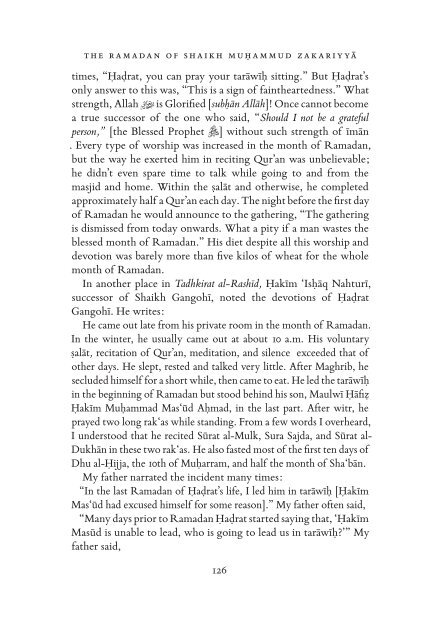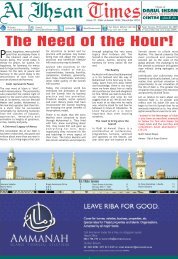TheRamadan of Shaykh Al-Hadith Ml ZakariyyaKandelwi by Dr Muhammad Ismail Memon Madani
TheRamadan of Shaykh Al-Hadith Ml ZakariyyaKandelwi by Dr Muhammad Ismail Memon Madani
TheRamadan of Shaykh Al-Hadith Ml ZakariyyaKandelwi by Dr Muhammad Ismail Memon Madani
Create successful ePaper yourself
Turn your PDF publications into a flip-book with our unique Google optimized e-Paper software.
the ramadan <strong>of</strong> shaikh muĤ ammud zakariyyĀ<br />
times, “Ĥađrat, you can pray your tarāwīĥ sitting.” But Ĥađrat’s<br />
only answer to this was, “This is a sign <strong>of</strong> faintheartedness.” What<br />
strength, <strong>Al</strong>lah u is Glorified [subĥān <strong>Al</strong>lāh]! Once cannot become<br />
a true successor <strong>of</strong> the one who said, “Should I not be a grateful<br />
person,” [the Blessed Prophet s] without such strength <strong>of</strong> īmān<br />
. Every type <strong>of</strong> worship was increased in the month <strong>of</strong> Ramadan,<br />
but the way he exerted him in reciting Qur’an was unbelievable;<br />
he didn’t even spare time to talk while going to and from the<br />
masjid and home. Within the śalāt and otherwise, he completed<br />
approximately half a Qur’an each day. The night before the first day<br />
<strong>of</strong> Ramadan he would announce to the gathering, “The gathering<br />
is dismissed from today onwards. What a pity if a man wastes the<br />
blessed month <strong>of</strong> Ramadan.” His diet despite all this worship and<br />
devotion was barely more than five kilos <strong>of</strong> wheat for the whole<br />
month <strong>of</strong> Ramadan.<br />
In another place in Tadhkirat al-Rashīd, Ĥakīm ‘Isĥāq Nahturī,<br />
successor <strong>of</strong> Shaikh Gangohī, noted the devotions <strong>of</strong> Ĥađrat<br />
Gangohī. He writes:<br />
He came out late from his private room in the month <strong>of</strong> Ramadan.<br />
In the winter, he usually came out at about 10 a.m. His voluntary<br />
śalāt, recitation <strong>of</strong> Qur’an, meditation, and silence exceeded that <strong>of</strong><br />
other days. He slept, rested and talked very little. After Maghrib, he<br />
secluded himself for a short while, then came to eat. He led the tarāwīĥ<br />
in the beginning <strong>of</strong> Ramadan but stood behind his son, Maulwī Ĥāfiż<br />
Ĥakīm Muĥammad Mas‘ūd Aĥmad, in the last part. After witr, he<br />
prayed two long rak‘as while standing. From a few words I overheard,<br />
I understood that he recited Sūrat al-Mulk, Sura Sajda, and Sūrat al-<br />
Dukhān in these two rak‘as. He also fasted most <strong>of</strong> the first ten days <strong>of</strong><br />
Dhu al-Ĥijja, the 10th <strong>of</strong> Muĥarram, and half the month <strong>of</strong> Sha‘bān.<br />
My father narrated the incident many times:<br />
“In the last Ramadan <strong>of</strong> Ĥađrat’s life, I led him in tarāwīĥ [Ĥakīm<br />
Mas‘ūd had excused himself for some reason].” My father <strong>of</strong>ten said,<br />
“Many days prior to Ramadan Ĥađrat started saying that, ‘Ĥakīm<br />
Masūd is unable to lead, who is going to lead us in tarāwīĥ?’” My<br />
father said,<br />
126



